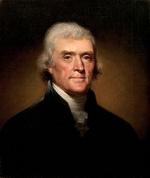|
This section contains 15,706 words (approx. 53 pages at 300 words per page) |

|
SOURCE: “Human Nature: Variations on Equality,” in Jefferson and Nature: An Interpretation, Johns Hopkins University Press, 1988, pp. 56-87.
In the following essay, Miller discusses Jefferson's views on human nature and equality. While Jefferson believed in the moral equality of all humankind, he felt that certain groups—blacks, Indians, and women—were not culturally, physically, or intellectually equal to white males.
As a natural historian, Jefferson distinguished one species from another by grouping individuals according to their “prominent and invariable” similarities. On this basis, the basis of comparative anatomy, the distinguishing nature of the human species was clear. But the important question was not What are humans physically? but What is human nature itself? What seems most invariable about people is precisely their variability, the great range of individual and social differences among mankind. These variations in temperament and culture unfortunately make it a difficult, perhaps impossible, task to...
|
This section contains 15,706 words (approx. 53 pages at 300 words per page) |

|


